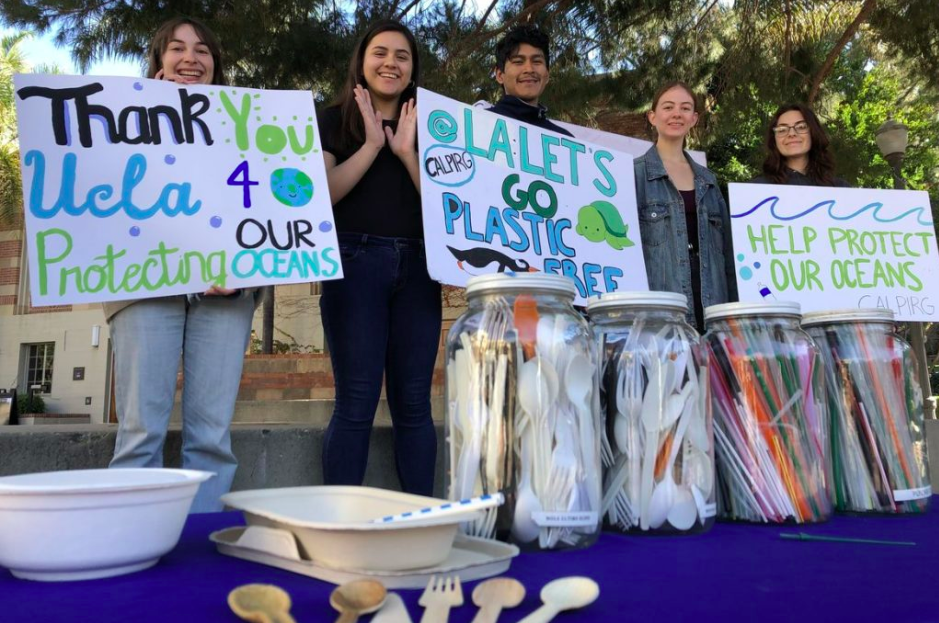Emily Rusch
Vice President and Senior Director of State Offices, The Public Interest Network
Vice President and Senior Director of State Offices, The Public Interest Network
UCLA is developing a new policy to remove environmentally harmful single-use plastics from campus food-service, making it one of the largest universities nationwide to pursue phasing out one-use plastics.
The draft single-use plastics policy, announced Jan. 24, aims to reduce the university’s impact on the environment and to encourage similar changes in the region. The first phase of the policy is scheduled to begin in July 2020, when UCLA plans to officially phase out plastic utensils, cup lids, bowls, plastic bags and similar “food accessory” items. Locally compostable or reusable alternatives would be provided only on request, and would shift over time to only reusable alternatives for all dine-in eaters.
“Nothing we use for a few minutes should pollute our oceans and environment for hundreds of years,” said Sithara Menon, UCLA chapter chair of the California Student Public Interest Research Group (CALPIRG Students). “My generation is concerned about the immense amount of plastic ending up in our waterways and ocean and its impact on marine life. That’s why I’m excited that UCLA is taking action it mitigate plastic pollution.”
Students brought student support to the policy, collecting 1,900 student signatures supporting the move away from single-use plastics. The group also made classroom announcements to approximately 10,000 students to help raise awareness about the need for change. Over the last two decades, Menon has noticed a dramatic increase in the amount of plastic littering Southern California beaches.
The policy is envisioned as ultimately including not only sit-down and take-out restaurants at UCLA, but also dining halls, events, and even departmental meetings. Everything from conferences, panel discussions and lectures to catered meetings, rallies and concerts would be covered. The draft policy envisions a path to ultimately eliminate single-use plastic water bottles on campus and increase water-refilling hydration stations.
“UCLA is part of the larger culture shift moving away from wishful recycling,” said Nurit Katz, the university’s chief sustainability officer. “Only a small percentage of plastic is successfully recycled despite decades of efforts nationwide and globally. By getting rid of single-use plastics, we will make the planet a little healthier, and help Bruins approach their goal of zero waste.”
CALPIRG students across the state are also advocating for bill that would address plastic pollution statewide, and hope this action at UCLA can embolden state leaders to act.
California’s Legislature is currently considering the Plastic Pollution Reduction Act which would chart a path to reducing single-use packaging and foodware by 75 percent by 2030. The bills, SB 54 and AB 1080, are authored by Senator Ben Allen and Assemblymember Lorena Gonzalez, and having getting attention by celebrities like Jeff Goldblum, who lobbied for the bill in Sacramento yesterday.
If passed, the bills will require manufacturers to design their product, food, and beverage packaging to reduce unnecessary waste. All remaining packaging will need to be able to be recycled or composted by 2030, and producers will have to demonstrate that their packaging products are being recycled at rates that ramp up over time to 75 percent by 2030. Finally, the bills require that common single-use foodware like plates and utensils also be fully recyclable or compostable by 2030.
“It’s tragic how often we see animals harmed by plastic pollution in our oceans, whether it’s straws in their nostrils or bags in their bellies” said Nic Riani, state Chairperson for CALPIRG Students.
The UCLA policy is expected to be ready for a 30-day public review by mid-March, and it is targeted to go into effect July 1. The campus has already eliminated Styrofoam and many single-use plastics in food service, and has shifted almost entirely to locally compostable flatware and to-go food service items.
Michael Beck, UCLA’s administrative vice chancellor said, “the enthusiasm and commitment of UCLA students to environmental causes help buoy the university’s progress. We have already eliminated several kinds of single-use plastics on campus, and students helped stimulate us to convert practice into policy.
The change won’t be easy, but UCLA sustainability staff say the campus is ready. They added hundreds of compost bins on campus, including in washrooms for paper towel waste. Conversations are already changing vendor habits, such as among those who once supplied individually plastic-wrapped tablecloths for special events but who now use reusable bags for linens. Likewise, years of campus “trash talks,” waste audits and awareness campaigns have prepared many Bruins, and the proposed policy change will include more outreach, said Kikei Wong, UCLA zero waste coordinator.
“It will be challenging,” Wong acknowledged. “There are so many single-use plastics everywhere in our lives that we depend on for convenience, but for the planet, this is the next step that we have to take.”
UCLA isn’t the first university to take this step, but it will likely inspire others, said Bonny Bentzin, deputy chief sustainability officer.
“UCLA is a leader with the ability to drive new policies and influence the purchasing practices across the region,” Bentzin said. “Vendors won’t change just part of their business. They’ll change their whole inventory and start to shift others over with us.”
Erin Fabris, sustainability manager for UCLA Housing and Hospitality, helped develop both the UC and UCLA draft policies.
“UCLA has a huge footprint,” Fabris said. “Expand that to all nine other campuses, and that’s a pretty significant change we can make in California.”

Students from CALPIRG’s UCLA campus chapter applaud the university for their commitment to phase out single-use plastics at an event with university officials on Friday, January 24th. (Photo credit: staff)